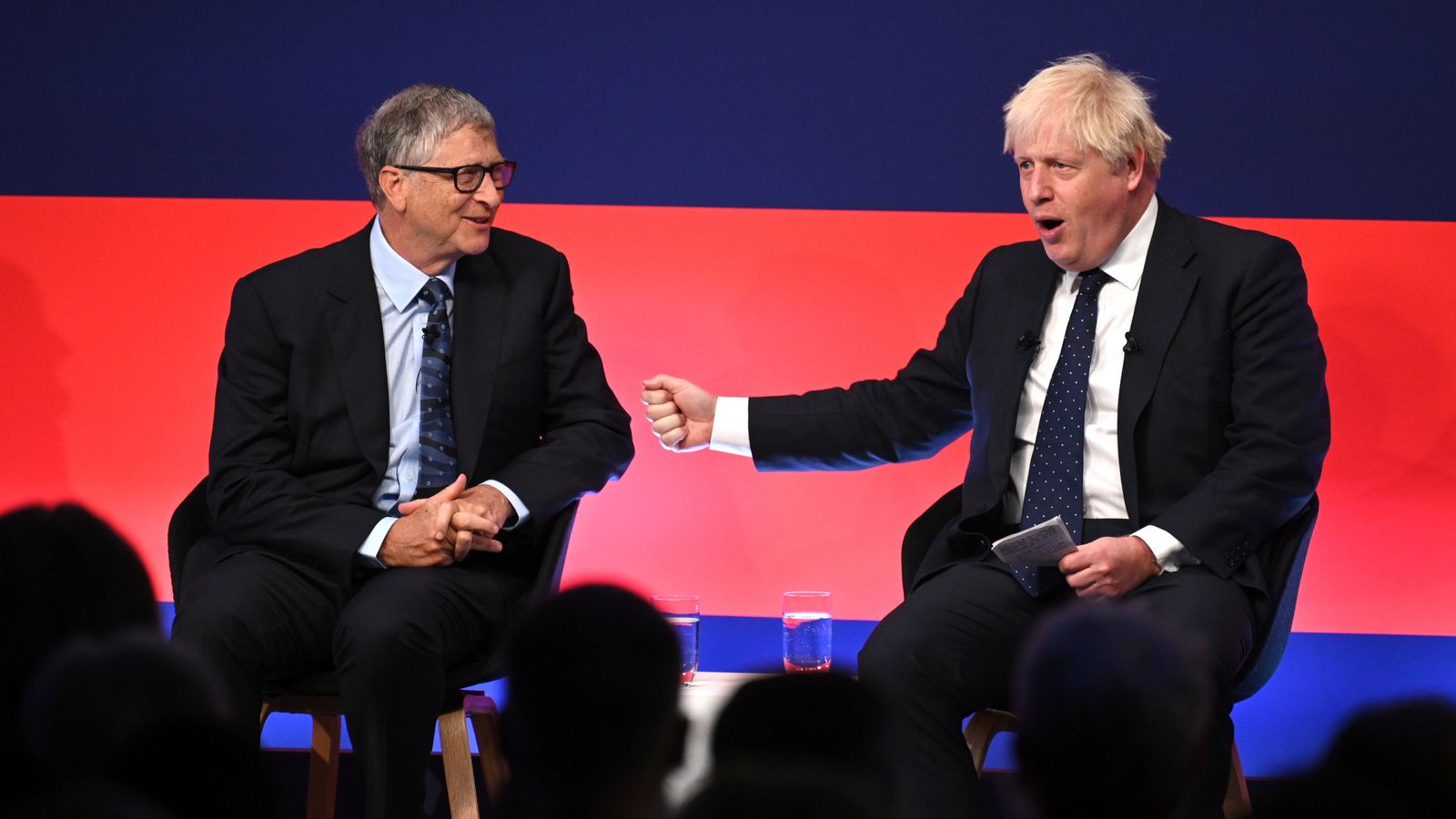In his pitch to persuade global investors to back the UK’s green industrial future Boris Johnson invoked Peppa Pig, Jeremy Clarkson and Gordon Gekko.
In response, we might paraphrase Mrs Merton’s infamous question, first posed to Debbie McGee, about how she came to marry magician Paul Daniels.
“So Prime Minister, what was it that first attracted you to investors worth $24trn?”
That was the figure Mr Johnson put on the capital controlled by the 175 invitees to the UK’s first Global Investment Summit, the start of a two week campaign of announcements and events culminating in COP26 in Glasgow.
Among the VIPs were Jamie Dimon, chief executive of JP Morgan and Larry Fink, billionaire founder of Blackrock, along with representatives of sovereign wealth funds – all tempted by access to the PM and dinner with the Queen.
In the words of one minister, the event was a chance for the UK to “show a bit of leg” in what is a global race for capital.
French president Emmanuel Macron has been hosting similar events at Versailles, and if a royal invite still impresses the super-rich, persuading them to dig into the deepest of pockets takes more than a trip to Windsor Castle.
Net zero strategy: Government plans will ‘support up to 440,000 jobs’, minister says – as plans to end sale of new petrol and diesel cars revealed
Heathrow passengers could see airport charges rise by 50% next year
Heat pump grants: Boiler upgrade scheme will see households able to apply for £5,000 grant to replace gas boilers
Mr Johnson was explicit about what’s in it for the UK. “I can deploy billions, with the approval of the chancellor of course, but you can deploy trillions of dollars… and I say to every one of those dollars, you are welcome!”
What’s in it for the who’s who – or should that be a ‘how much?’ – of global investment gathered at the Science Museum will take a little longer to emerge, as will which technologies are worth pursuing.
By definition, many of the green innovations that science, industry and states are chasing will fail.
Hydrogen power, carbon capture and sustainable air fuel are just three of the innovations that might allow consumers to retain the luxuries of modern life without the climate burden, but all are unproven at scale.
Establishing which work will cost money, and the PM was right to say that governments cannot do it alone.
A pleasure to sit down with @BillGates at the Global Investment Summit today, where we announced a new £400m partnership between the government and @Breakthrough to supercharge a green industrial revolution across the UK: https://t.co/yUDqXdrjJ1#UKinvestment #BuildBackBetter pic.twitter.com/9lREGD5UyP
It’s why he was so keen to welcome Bill Gates to London and trumpet a joint £400m project with the Microsoft founder’s green philanthropic venture Breakthrough Energy.
Managing director Jonah Goldman told Sky News they can take chances traditional investors will not: “Innovation takes chances and it takes risk. It’s the highest risk capital, it’s science, it’s the things the UK has really excelled at. And it’s knowing how to take innovation, fail fast and move on to the next day.”
The green transformation won’t happen without state support either. Grants, planning and legislation will all be required to pave the way for investment, with ministers estimating for every £1 of state funding they can leverage £8 of private funding.
By way of example, the government trumpeted a £6bn wind farm investment by Iberdrola, owner of Scottish Power, as a win from the summit.
In reality the project was announced more than a year ago and will not happen without planning permission and government guaranteeing a price for the energy it produces.
On a domestic scale the issue is captured in the challenge of domestic heating.
To hit net zero by 2050 the UK has to replace its domestic stock of gas boilers, but their likeliest replacement, electric air-source heat pumps, cost at least three times as much.
To direct change, the government has announced £5,000 grants for consumers, bringing the price down to as little as £2,500, comparable with a new gas boiler today. Further reducing that price will be an obvious avenue for investment and technology to follow.
Please use Chrome browser for a more accessible video player
As well as setting out Britain’s green credentials the PM had another job; to reassure investors that the UK really is a welcoming place to do business after months, arguably years, of hostility in the domestic context.
In the last fortnight he has blamed employers for “mainlining” cheap immigration and driving down wages, all as concerns have grown that continuing tensions with the EU are stoking a potential trade war.
For a problem as thorny and expensive as halting climate change, business leaders need to be persuaded that the UK will remain a stable, secure and profitable environment.
Peter Lacy of Accenture, sponsor of the Science Museum summit, said investors want certainty.
“I think one of the most important things to come out of this summit, if it goes well, is clarity about what you’re talking about in terms of what it means to investors.
“Last night, all of us gathered at the Guildhall, we heard Rishi Sunak lay out his plan, but I do think that there is still a lack of clarity, and that’s where I think a lot of people are looking to the other announcements we’ll see ahead of COP, so I don’t think the job is done yet.
“But hearing from the prime minister, hearing from other ministers, hearing from other businesses, is essential for global CEOs. Investors are not going to invest in countries that don’t have clear trade relationships, a clear vision and strategy, the rule of law and clarity around their concept.
“So that is what investors are looking for here over the next two weeks.”






















